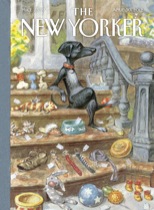April 30, 2012: “Hand on the Shoulder” by Ian McEwan
It seemed evident from reading this “story” (available for free online, by the way), that it is an excerpt from a novel, and this is confirmed in the Q&A with Ian McEwan (the novel is called Sweet Tooth, which I think is a horrible name, but maybe it works for that particular book).
While the prose here is beautiful, and the situation—a woman recruited during the Cold War to work for Britain’s MI5—interesting, as a short story this falls completely flat for me. I kept waiting for something surprising to happen, and it didn’t. Everything about it seems trite. Although it has a nice narrative arc and good tension, a story about adultery that meets a bad end is just too stale. Yes, the MI5 angle is interesting, but that’s about it. As a piece of the novel I suspect it’s fine, and I might even read this book, but I wish The New Yorker wouldn’t do this to us.


>This was one of the better stories I've read lately in the New Yorker. I thought the way the characters were drawn, esp. the duplicity of the "older man," was painfully believable.McGregor's ability to get into the mind of a young, brainy female university student was spot on. Sure, this may be a hackneyed,even predictable story, but I cared about Serena and came away wanting to know more about her. The story resonated past the ending, which, to me, is the definition of good writing.
>'scuse me, meant to say "McEwan."
>Although I enjoyed the writing the situation is so pre-feminist era it was difficult to read. I am SO glad the 60's happened and made all women better for it. I also disagree that he was in he 'mind' of a young brainy female, I never enjoy stories written by a man from the woman's point of view. When I was 21 which was just about 1972 I never would have slept with a guy with that body! I see huge traces of "Educating Rita" in this story perhaps that is why I envisioned Caning as Michael Caine.
Phyllis, I agree with what you said. Regardless of whether this is a short story or an excerpt, it doesn’t work as a first person female point of view, within a paragraph or two I sensed it was a man trying to mimic a woman’s voice, and falling flat at that, maybe if you’re a fan of mystery stories or of Ian McEwan it’s a quibble, but The New Yorker pretends to a higher calling.
>"I never enjoy stories written by a man from the woman's point of view."
I find this to be an extraordinary statement. Never? Do you think it's not possible to write the "other"?
Phyllis, I agree with what you said. Regardless of whether this is a short story or an excerpt, it doesn’t work as a first person female point of view, within a paragraph or two I sensed it was a man trying to mimic a woman’s voice, and falling flat at that, maybe if you’re a fan of mystery stories or of Ian McEwan it’s a quibble, but The New Yorker pretends to a higher calling.